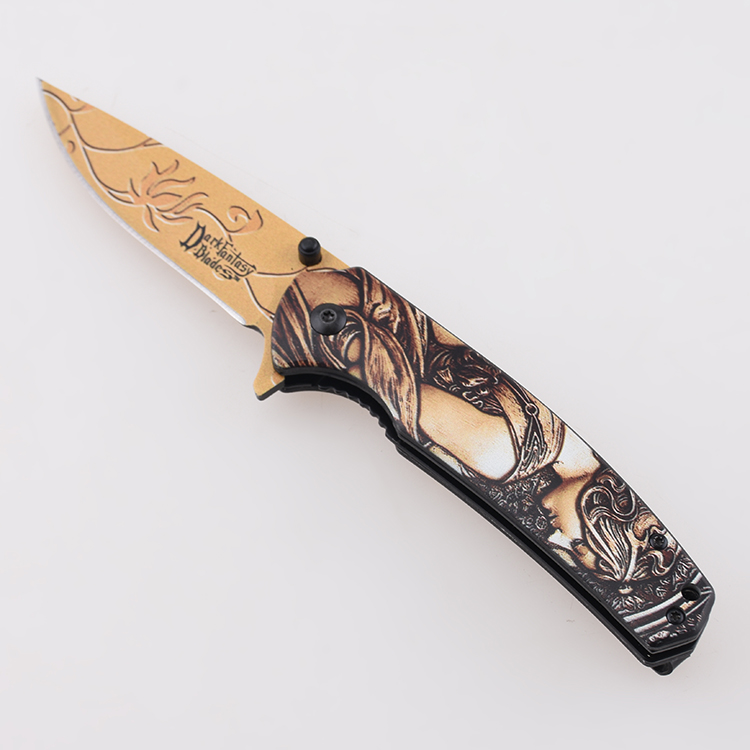
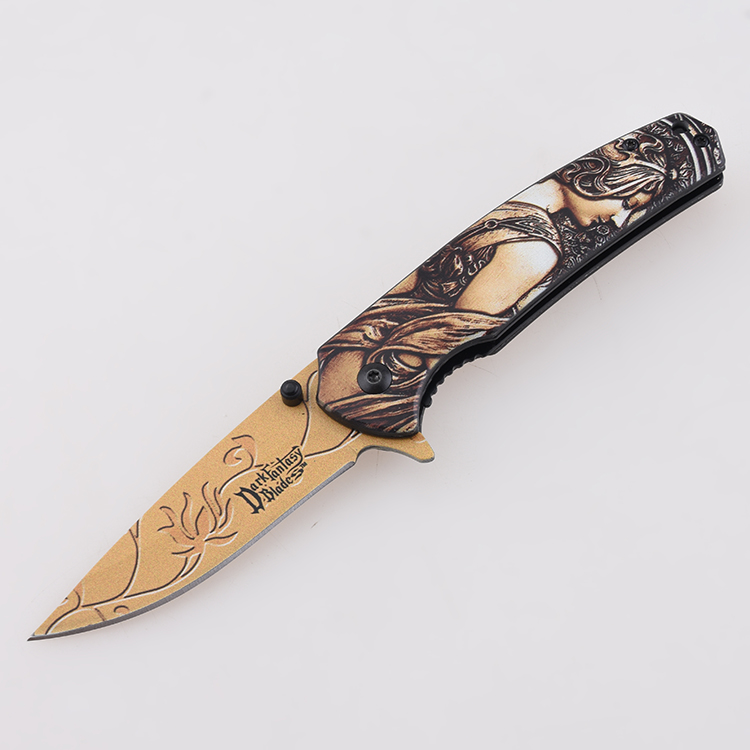
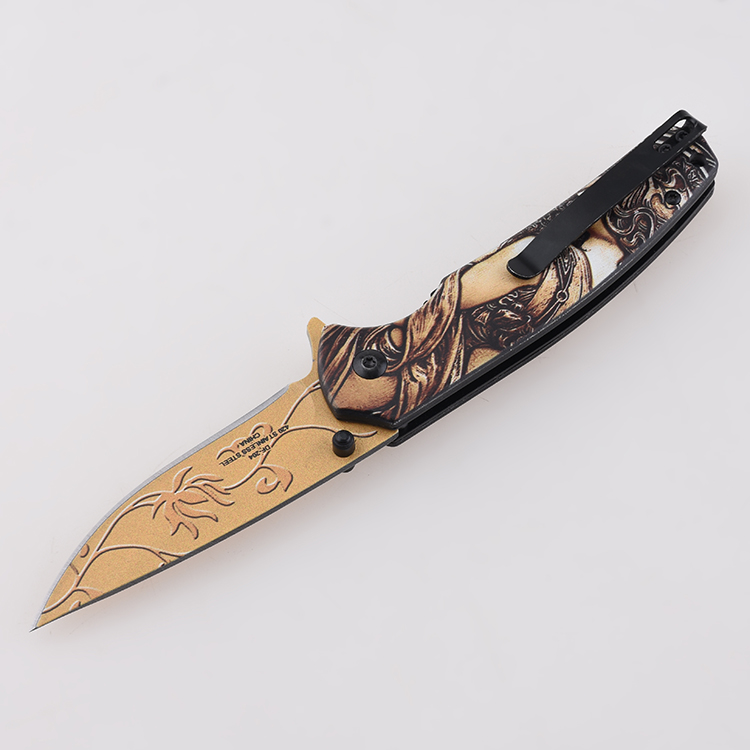
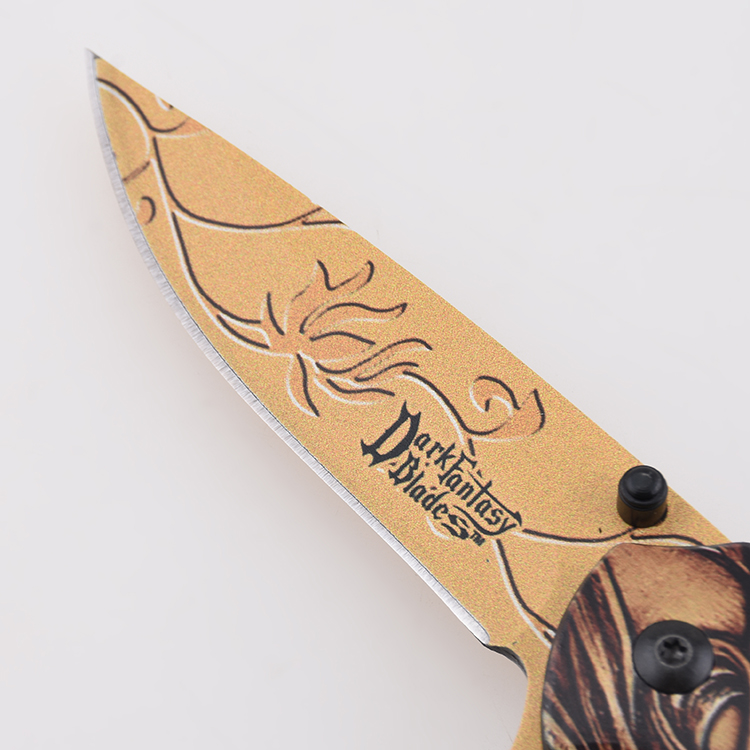
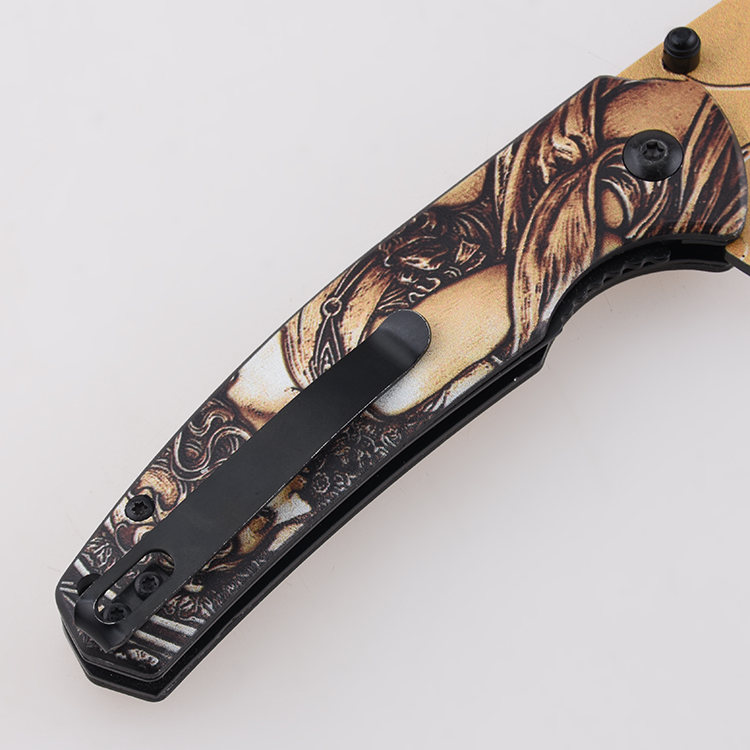
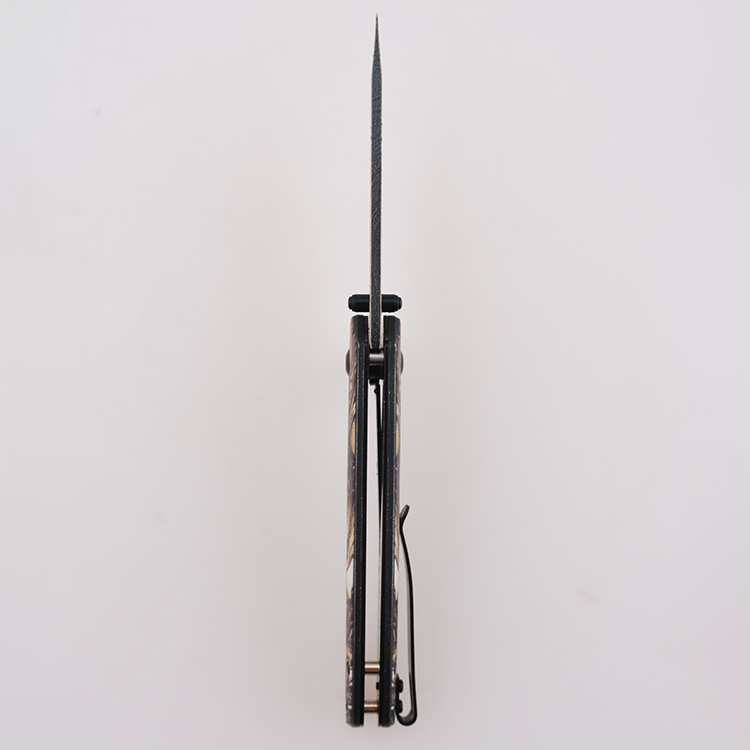
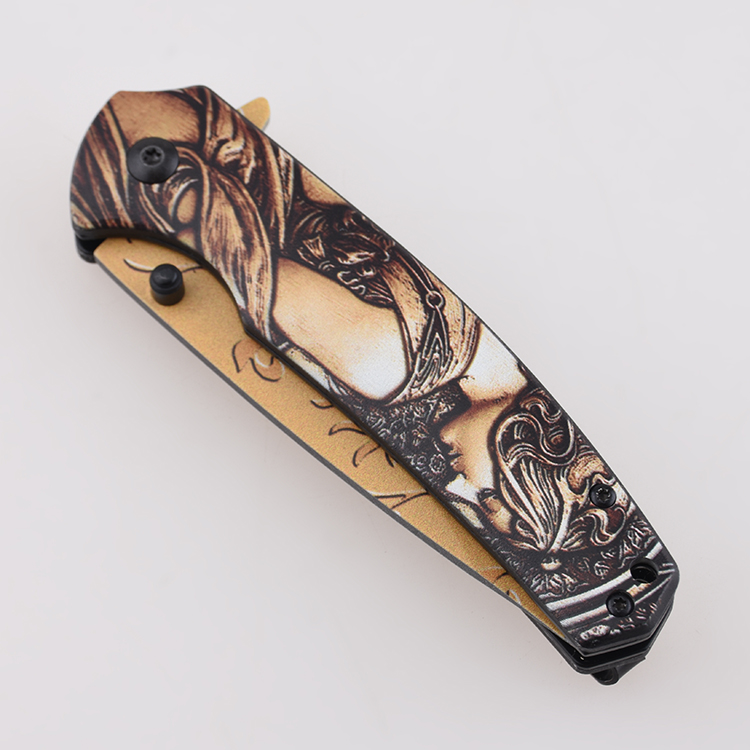
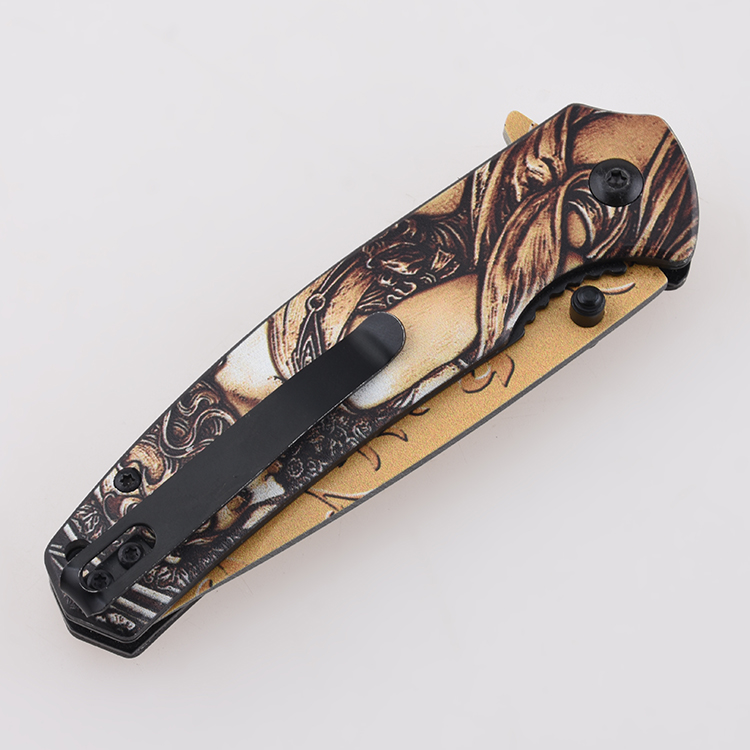
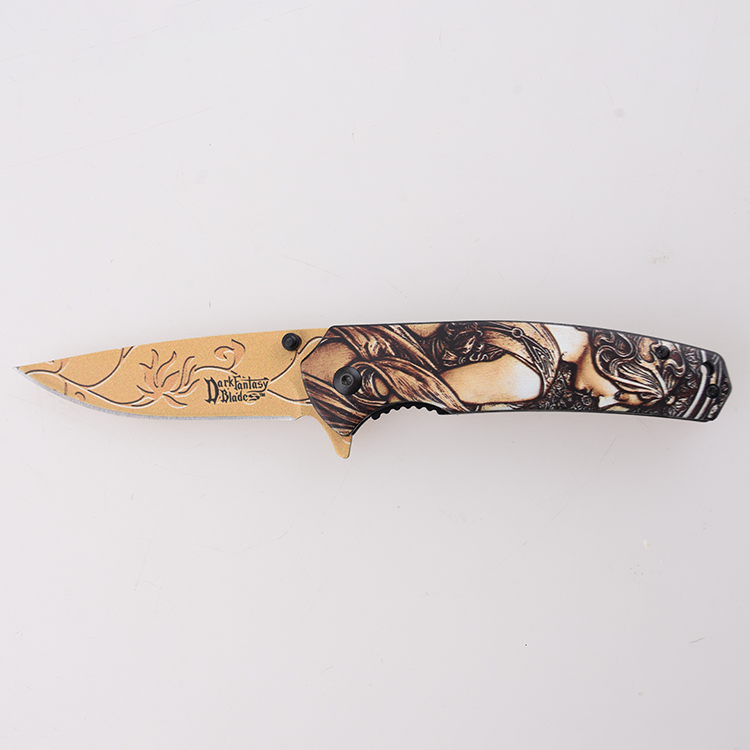
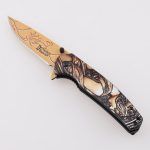
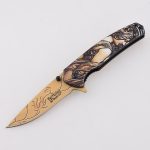

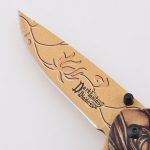

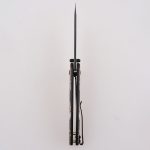

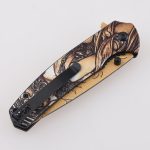
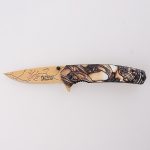
Item número.: YML-3414
Segmento de item: Faca dobrável
Material da lâmina: 3Cr13
manusear material: Alumínio anodizado
Lâmina HRC: 50-52
Espessura da lâmina: 0,126" / 3,2 mm
Comprimento da lâmina: 3,74”/95mm
Espessura do cabo: 0,571”/14,5 mm
Comprimento total: 7,76" / 197 mm
Peso: 4,57 onças/129,5g
Estilo da lâmina: Ponto de descida
Lidar com cor: Colorida
clipe de bolso: Tip-up
Mecanismo de bloqueio: Bloqueio de forro
caminho aberto: Flipper + pino de polegar
Acabamento da lâmina: impressao 3D
Moagem da lâmina: Plano
MOQ regular: 1200
In the realm of cutting-edge tools, the YML-3414 faca dobrável emerges as a paragon of functional artistry, offering a harmonious blend of rugged utility and visual appeal. Shieldon, a distinguished name in Manufacturing & Trading Combo businesses, presents this exceptional folding knife, designed for aficionados who appreciate the meticulous craftsmanship and innovative advancements in knife technology. The YML-3414 isn’t just a tool; it’s a statement piece, a dependable companion for the discerning user who values both performance and style.
Visão geral do produto
With its vibrant, anodized aluminum handle and the distinctive 3D printed logo finish, the YML-3414 folding knife stands out in Shieldon’s catalog. Meticulously engineered to be more than just a cutting instrument, this knife is a testament to Shieldon’s commitment to excellence.
Blade: A Fusion of Strength and Precision
The blade of the YML-3414 is forged from 3Cr13 stainless steel, known for its reliable durability and ease of sharpening. With a hardness rating of 50-52 HRC, it strikes a balance between maintaining a sharp edge and resisting wear. The drop point style of the blade, measuring a versatile 3.74 inches, is a testament to its all-purpose design, capable of performing a plethora of cutting tasks with precision and ease. The blade’s thickness of 0.126 inches adds to its robustness, making it less prone to breaking under pressure.
Handle: Ergonomic and Artistic
Encasing this formidable blade is a handle crafted from anodized aluminum, offering both lightweight comfort and enduring strength. The anodization process not only adds to the handle’s corrosion resistance but also allows for a spectrum of vibrant, colorful finishes that can withstand the rigors of daily use. With a substantial thickness of 0.571 inches, the handle provides a secure and ergonomic grip, ensuring that the knife feels like an extension of the hand.
Aesthetic: 3D Printing Innovation
The YML-3414 takes aesthetic customization to new heights with its 3D printed image logo finish on the blade. This advanced technique allows for intricate designs and unique branding opportunities, turning each knife into a personalized masterpiece. The printing not only enhances the visual appeal but also creates a tactile experience that differentiates the YML-3414 from its contemporaries.
Functionality: Seamless Operation
Equipped with both a flipper and a thumb stud, the YML-3414 offers versatile open ways to suit any preference. The blade deploys smoothly and locks securely into place with a reliable liner lock mechanism, a staple in the folding knife industry for its simplicity and effectiveness. The tip-up pocket clip affords convenient and discreet carry, ensuring that the knife is always within reach when needed.
Technical Specifications
Purchasing the YML-3414
When considering the purchase of the YML-3414 folding knife for retail, collection, or personal use, buyers can rest assured that they are investing in a product that reflects a legacy of quality and innovation. The regular Minimum Order Quantity (MOQ) of 1200 units is a testament to Shieldon’s scalability and commitment to catering to both large and small businesses.
The Shieldon Promise
Shieldon’s Manufacturing & Trading Combo business model ensures that each YML-3414 knife is not only a tool but an experience. From the moment of unboxing to the daily tasks it performs, the YML-3414 is designed to exceed expectations. With a focus on customer satisfaction, Shieldon’s responsive service and comprehensive after-sales support encapsulate the confidence and pride imbued in every product.
Conclusão
The YML-3414 folding knife is more than just a sum of its parts; it is a symphony of design, functionality, and innovation. With Shieldon’s commitment to excellence and an understanding of the nuances of knife craftsmanship, each YML-3414 is poised to carve its mark in the world of folding knives. Whether for the discerning collector, the practical outdoorsman, or the retail entrepreneur, the YML-3414 presents an opportunity to possess not just a knife, but a piece of precision-engineered artistry.
Understanding the properties of various materials used for folding knife handles is crucial to selecting the right knife for your needs. Each material has a unique chemical composition that influences its feel, durability, grip, and overall performance. This guide will help demystify the common materials used in folding knife handles, shedding light on what each offers to the end-user.
Metal Handles: Strength and Elegance
Metal is a popular choice for folding knife handles, with options like stainless steel, aluminum, and titanium being the most prevalent.
Aço inoxidável: Renowned for its strength and resistance to corrosion, stainless steel handles are heavy, providing a solid feel and balance. The chromium in the steel alloy (usually at least 10.5%) offers corrosion resistance, while carbon and other elements enhance durability.
Alumínio: A lightweight alternative to stainless steel, aluminum handles are often anodized for color and increased corrosion resistance. This process modifies the surface layer of the metal, altering its chemical composition to create a harder, more protective finish.
Titânio: This metal is known for its exceptional strength-to-weight ratio. It’s lighter than stainless steel but stronger and more wear-resistant. Titanium handles often feature a unique blend of vanadium and aluminum to enhance strength, and they can be anodized like aluminum for color and additional corrosion resistance.
Synthetic Handles: Modern and Versatile
Synthetic materials, such as plastics and composites, are also widely chosen for their versatility and cost-effectiveness.
G-10: A fiberglass-based laminate, G-10 is impregnated with an epoxy resin binder to create a material that’s tough, impervious to moisture, and has excellent insulation properties. The chemical composition ensures that it’s not only durable but also provides a solid grip even in wet conditions.
FRN (Fiberglass Reinforced Nylon): This material is nylon-based, mixed with glass fiber to increase its structural integrity. It’s lightweight and available in a variety of textures and colors. The chemical bond between the nylon and glass fiber gives FRN handles superb toughness and resistance to bending and abrasion.
Zytel: A trademark name for a form of nylon, Zytel handles are similar to FRN but typically softer and more rubbery to the touch. This is due to the chemical composition of the nylon, which can be adjusted to achieve different levels of flexibility and grip.
Natural Handles: Classic and Timeless
For those who appreciate tradition and natural beauty, materials like wood, bone, and horn are still in demand.
Madeira: A classic handle material, wood is organic and varies widely in density, hardness, and stability based on the type of tree it comes from. The chemical makeup of cellulosic fibers and organic compounds in wood makes it susceptible to moisture and temperature changes, which can lead to warping or cracking.
Osso: Typically derived from cow bones, bone handles are stabilized through a chemical process that fills the natural pores and makes them more resistant to moisture. They offer a traditional look and can be dyed to achieve different colors and patterns.
Horn: Similar to bone, horn is usually obtained from buffalo and can be treated chemically to improve durability. It provides a smooth, dense handle that feels warm to the touch and offers a unique appearance with natural striations.
Carbon Fiber: Lightweight and High-Tech
Carbon fiber is a high-end material often used in premium knives. It’s composed of thin strands of carbon that are woven together and set in resin. The carbon strands provide incredible strength and stiffness, while the resin binds them together, forming a material that’s lighter than G-10 but just as resistant to wear and tear.
Conclusão
Altogether, the chemical makeup of faca dobrável handle materials defines their performance and aesthetic appeal. Metals like stainless steel, aluminum, and titanium offer varying degrees of durability and weight, while synthetic materials such as G-10, FRN, and Zytel provide exceptional toughness in lightweight forms. Traditional materials like wood, bone, and horn bring natural beauty and warmth to a knife but require more care to maintain. High-tech options like carbon fiber deliver an unbeatable strength-to-weight ratio for those seeking top-tier performance. Understanding these differences is key to choosing a folding knife that will serve you well in both function and form.
Estamos prontos para ajudar em qualquer estágio do seu projeto de faca OEM. Envie-nos sua dúvida e seu orçamento e entraremos em contato dentro de 24 horas.